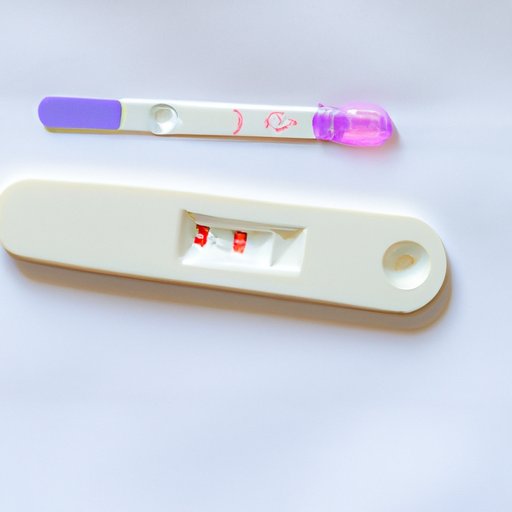
I. Introduction
Getting a positive pregnancy test is one of the most exciting experiences for a woman. However, timing is everything, and the question on every woman’s mind is – how early can you get a positive pregnancy test? The answer is not straightforward and can vary depending on various factors. In this article, we will explore the science behind pregnancy tests, the timing of ovulation, implantation, and how that affects the timing of a positive test. We will also discuss early signs and symptoms, factors affecting early detection, and practical tips for women to get the most accurate results.
II. Understanding the Process from Ovulation to Implantation
Before we jump into how early you can get a positive pregnancy test, it is important to understand the process that leads to pregnancy. Ovulation occurs when a mature egg is released from the ovary and travels down the fallopian tube, where it can be fertilized by sperm. Once fertilization occurs, the egg divides into multiple cells and transforms into a ball of cells known as a zygote. The zygote then travels down the fallopian tube and towards the uterus, where it will implant into the lining of the uterus. This process is known as implantation, and it typically occurs around 5-10 days after fertilization.
III. How Home Pregnancy Tests Work
Home pregnancy tests (HPTs) work by detecting the presence of a hormone called human chorionic gonadotropin (hCG) in a woman’s urine. hCG is produced by the cells that form the placenta after implantation occurs. The levels of hCG increase rapidly during the early stages of pregnancy and double every 48-72 hours. Most over-the-counter pregnancy tests are designed to detect hCG levels above a certain threshold, which can range from 10-25 mIU/mL, depending on the brand.
You might be wondering if all pregnancy tests are the same. The answer is no. There are different brands of HPTs available, and some are more sensitive than others. Sensitive tests can detect lower hCG levels and can produce accurate results earlier than less sensitive tests. However, more sensitive tests can also be more expensive.
IV. Early Signs and Symptoms of Pregnancy
Some women claim to experience symptoms of pregnancy shortly after conception, but most women will not experience any noticeable symptoms until after a missed period. Nausea, vomiting, fatigue, and breast tenderness are all common early signs of pregnancy. A missed period is also one of the most reliable indicators of pregnancy. However, keep in mind that these symptoms can also be caused by other factors, such as stress or hormonal imbalances.
V. Factors Affecting Early Detection
Several factors can affect the timing of a positive pregnancy test. Age is an essential factor; as women age, their fertility declines, and it can take longer to conceive. Besides, older women might produce lower levels of hCG, which can affect early detection. The quality of the pregnancy test also plays a significant role in early detection. Cheaper tests are often less sensitive and may not detect hCG levels until later in pregnancy. It’s important to use a reliable and reputable brand of HPT for the most accurate results.
VI. Importance of Timing
The timing of a pregnancy test is crucial. The best time to take a pregnancy test is after a missed period or around two weeks after ovulation. Taking a test too early can produce a false-negative result, even if you are pregnant. It’s also essential to test with the first urine of the day, as it contains the highest concentration of hCG.
VII. Tests Beyond Home Pregnancy Tests
If you suspect you are pregnant and want to confirm your results, there are a few other tests available. Blood tests can detect lower levels of hCG and provide an accurate result within days of conception. An ultrasound can also confirm a pregnancy earlier than an HPT.
VIII. Practical Tips for Women
There are several practical tips women can use for the most accurate results. Tracking ovulation using a basal body temperature (BBT) or an ovulation predictor kit (OPK) can help pinpoint the best time to test. Testing with the first urine of the day and following the instructions carefully can also produce accurate results. Be patient, and remember that early detection is not always possible.
IX. Conclusion
In conclusion, the timing of a positive pregnancy test can vary depending on various factors. Understanding the science behind pregnancy tests, the timing of ovulation, and implantation can help you determine the best time to test. Early signs and symptoms of pregnancy can provide clues, but it’s essential to remember that every woman’s experience is different. Factors affecting early detection, such as age and the quality of the pregnancy test, can also play a role. Following practical tips such as tracking ovulation and testing with the first urine of the day can help you get the most accurate results.
Final recommendations: If you believe you are pregnant, wait until you have missed a period and use a reliable HPT to confirm your results. If your results are inconclusive, wait a few days and test again or visit your healthcare provider to receive a blood test or ultrasound. Remember that early detection is not always possible, so be patient, and trust your body.




